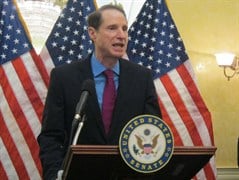
US Sen. Ron Wyden, in a Guardian article he wrote based on his speech at a Cato Institute event this week, reinforces RPI’s warnings that efforts to reform the US government mass spying program “provide an excellent opportunity to make bad legislation worse” and that the spying “threatens American companies’ business prospects in the international marketplace.”
Wyden first warns that the “business-as-usual-brigade” will do everything it can to prevent the realization of pro-liberty curtailments of the mass spying program. Wyden comments in the Guardian article:
I know these issues will be discussed here today, so I’ll start with my bottom line: the goal of our bipartisan bill is to set the bar for measuring meaningful intelligence reform. We wanted to put this marker down early because we know in the months ahead we will be up against a “business-as-usual brigade” – made up of influential members of the government’s intelligence leadership, their allies in thinktanks and academia, retired government officials, and sympathetic legislators. Their game plan? Try mightily to fog up the surveillance debate and convince the Congress and the public that the real problem here is not overly intrusive, constitutionally flawed domestic surveillance, but sensationalistic media reporting. Their end game is ensuring that any surveillance reforms are only skin-deep.
Some of the “business as usual” arguments have something of an Alice in Wonderland flavor. We have heard that surveillance of Americans’ phone records, aka metadata, is not actually surveillance at all – it’s simply the collection of bits of information. We’ve been told that falsehoods aren’t falsehoods – they are simply imprecise statements. We’ve been told that rules that have been repeatedly broken are a valuable check on government overreach. And we’ve been told that codifying secret surveillance laws and making them public surveillance laws is the same as actually reforming these overreaching surveillance programs. It’s not.
These arguments, of course, leave the public with a distorted picture of what their government is actually up to. Those tiny bits of information, when put together, paint an illuminating picture of what the private lives of law-abiding Americans are like. Erroneous statements that are made on the public record but never corrected mislead the public and often members of Congress, as well. Privacy protections that don’t actually protect privacy are not worth the paper they are printed on; and just because intelligence officials say that a particular program helps catch terrorists doesn’t make it true.
Still, Wyden sees reason for optimism in the close House of Representatives vote on the US Reps. Justin Amash and John Conyers defense appropriations amendment to restrict spying. The key to curtailing the US mass spying program, according to Wyden, is “grassroots support from lots of Americans across the political spectrum who let their members of Congress know that they want both their security and their liberty to be protected, and that ‘business as usual’ is no longer OK.”
In addition to infringing liberty, Wyden warns that the mass spying program is also undermining the competitiveness of American companies:
But the effects of constitutionally flawed, overly intrusive surveillance programs go beyond the intrusion on Americans’ privacy. American companies that are believed to have been the subject of government surveillance orders are taking a major hit internationally and here at home. This is a serious economic issue. We live in a global marketplace and American digital companies compete on a global playing field to a degree that was unheard of ten years ago. If they start to lose ground to foreign competition, it will put tens of thousands of high paying jobs at serious risk.
If a foreign enemy were doing this much damage to our economy, people would be out in the street with pitchforks. These companies are now filing lawsuits to force the government to allow them to release more information about how many surveillance orders they have received, in an attempt to repair some of the damage that has been caused.
Just within the last week, I was talking to a company president from one of America’s leading digital service companies, and the first thing this executive said to me was what a big impact this unchecked domestic surveillance was having on that company. To be fair, I don’t expect NSA officials to spend their time thinking about the economic impact that unrestrained surveillance can have, but the policymakers who sign off on these over-broad surveillance programs should absolutely be thinking about the impact that these programs can have on American jobs, and on trust for American companies around the world.
Read Wyden’s entire article here.
